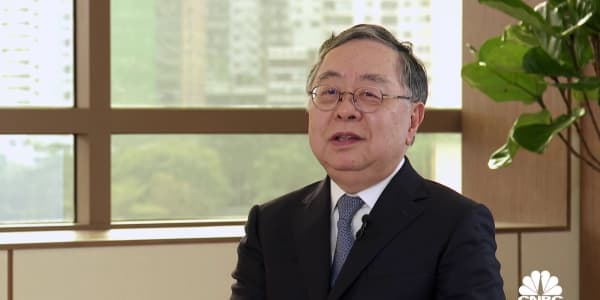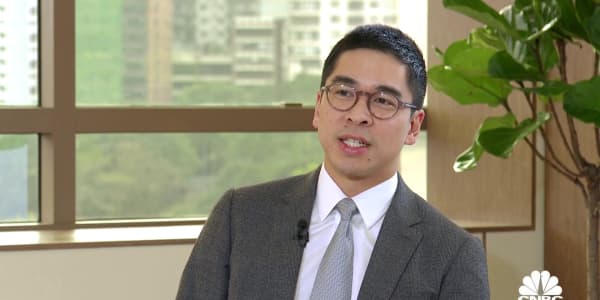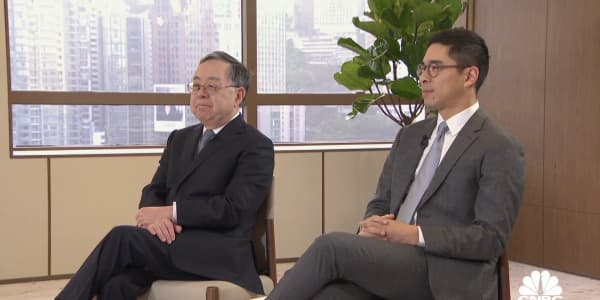
Former U.K. Prime Minister Tony Blair has told CNBC that some of the rules put in place by the U.K. government in response to the Covid-19 crisis are not very clear, including the 14-day quarantining of all travelers to Britain, and changes to plans for schools reopening.
Blair also said that the political situation involving current Prime Minister Boris Johnson's senior aide, Dominic Cummings, who faced pressure to resign after allegedly breaking government lockdown rules, had caused "a big credibility problem for the government."
Blair, who is founder and executive chairman of the Tony Blair Institute for Global Change, which is currently devoting its efforts towards the response to Covid-19, was speaking ahead of his address to the 2020 virtual CogX Global Leadership Summit and Festival of AI and Breakthrough Technology.

"The main thing is to have the rules clear, and some of them, frankly, like the ones of quarantining when people come into the country now, are really not very clear," he said.
"And then there's been changes over what we're doing with schools and so on. The most important thing in this situation is to have a grip and all the different aspects of it being dealt with by competent people with the right mix of skills, but the other thing is constantly to explain to people why you're doing what you're doing and explaining the calculus of risk."
The U.K. government was not immediately available for comment when contacted by CNBC.
In office between 1997-2007, Blair said he had a lot of sympathy as a former prime minister for "the toughest challenge I've ever seen government have to face." But he added that it was important to understand what was necessary to put in place a "containment infrastructure" to minimize the consequences of the virus and get out of lockdown as fast as possible.
"At the heart of it, in my view, is this issue of mass testing, and the government started by saying that they wanted mass testing, and now it's not really clear to me that they're still going for that,' he told CNBC.
Blair said the economic impact of Covid-19 was "vast" and that accelerating efforts to develop a vaccine, and testing to make people aware of their disease status, would help build confidence and get the economy moving again.
During his time as prime minister, Blair collaborated closely on global crises with former U.S. Presidents Bill Clinton and George W. Bush.
Asked about global cooperation and how he felt President Donald Trump was handling the response to Covid-19, Blair said global coordination was essential to share data, vaccine developments, testing capabilities and measures to reflate the global economy.
"It's about recognizing that there's certain points of cooperation that's in everyone's interest to do. And even if the America-China relationship is now going to a much more hostile place, which I think is inevitable now, you still need to reserve, even in that relationship, space for cooperation where it's necessary," he said.
The former leader also acknowledged that a U.S election year was the worst time to be dealing with a crisis in the country, "because the politics are so overwhelming, particularly in a tight-fought race, obviously it's the backdrop for any decision making,' he said.
Trump has postponed this year's meeting of the G-7 – made up of the U.S., Canada, U.K., France, Italy, Germany and Japan - until at least September. He has also said he would like to invite Russia, Australia, South Korea and India to join an expanded summit, to reportedly build an alliance against China.
WHO doing 'the best they possibly can'
Speaking about Trump's recent decision to "terminate" the U.S.'s relationship with the World Health Organisation, Blair told CNBC that while significant changes at WHO may be necessary in the medium-to-long term, they were doing "the best they possibly can."
"This was an organization set up to deal with localized epidemics, not a global pandemic of this scale," he said, adding: "There's a lot of politics in this obviously," but "right now I think it's important not to destabilize them."

He also told CNBC about the "shock and horror" he felt on hearing of the death of George Floyd, the African-American man who died while in the custody of the Minneapolis police. Floyd's death, which was filmed, sparked anti-racism protests and Black Lives Matter demonstrations in the U.S. and around the world.
"People feel this is a moment in time which has got to be an inflection point on this particular question," Blair said.
Asked about the anti-racism protests in the U.K., which led to some historical and colonial statues being toppled or defaced, Blair said this sort of action was the wrong way to deal with the issue. He warned protestors that it played into the hands of extremists.
"What happens with any good cause is you get some people get on the back of it, and then start to take it in extreme directions and then they alienate people, and by the way, always play into the hands of the far right when they do it," Blair said.





